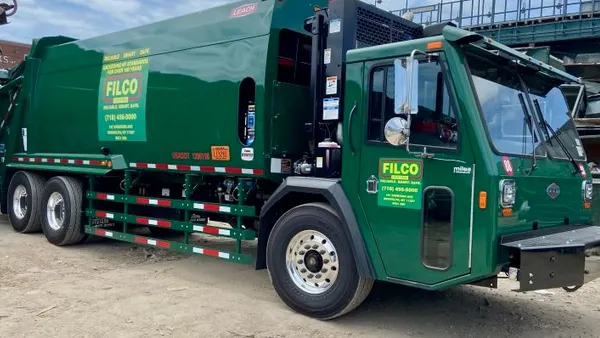Dive Brief:
- The ELD mandate tops fleets' challenges, even considering the advent of the FMCSA's final HOS rule, according to a recent survey by J.J. Keller.
- The provider of compliance products and services asked carriers their views on the final HOS rule but discovered ELD concerns were more pressing. Those concerns include: recordkeeping requirements, collecting supporting documents and managing ELD requirements, the survey said.
- More than one-third of survey respondents said they had not discussed with vendors how the HOS changes impact ELD use, forms, training programs and reference materials, according to J.J. Keller.

Dive Insight:
It's a misconception that ELDs are a set-and-forget technology. The logging devices require driver input, and now that the HOS final rule is in effect, fleets must make sure their ELD vendors are up to date on the latest regulations, as well as their drivers.
"I think fleets should be taking advantage of these new provisions. But to take advantage, you have to have a technology provider that is on top of its game ... that is issuing the updates," said Ken Evans, founder, CEO and chief technology officer at ELD provider Konexial.
Just like a driver must be aware of when the new HOS rules stop the driving window, so must the ELD. That requires a software update. But not all ELDs are the same, and fleets should be aware of what is required to facilitate the updates.
No matter what ELD a truck has, Konexial recommends short-haul truckers equip the technology. This is an area where fleets could inadvertently become noncompliant.
Of the 506 carriers that submitted qualifying responses to the J.J. Keller study, more than 23% said they anticipated the short-haul exception in the final HOS rule would impact their use of ELDs, while nearly 30% were uncertain if it would.
Evans said some short-haul customers think they don't have to track their hours. "The answer to that is, 'No. That's not right.' What it exempts you from is that you don't have to use an ELD to track them. But you still have to report the work and the work hours," he said.
Short-haul operations are exempt from the ELD mandate. But they are not exempt from HOS. So, if a driver exceeds the maximum duty period under the short-haul exemption — which was extended to 150 air miles in the final rule — HOS reporting requirements begin, and reporting must be done for the entire day.
The HOS update most complicated for ELD vendors is the sleeper-berth exception, Evans said. Because the new rule gives drivers flexibility in splitting those hours, the ELD must be able to keep up accurately. Did the driver take enough time? And when the driver is taking time, is it as part of the sleeper-berth exception, or something else?
If a truck is equipped with a large, expensive, older telemetry product that requires the truck to be out of service during installation, "you're missing the boat, because the technology has moved on," Evans said.
But ensuring drivers are compliant with HOS changes is also a struggle. J.J. Keller found fleets' top four HOS challenges are:
- Driver compliance regarding recordkeeping requirements.
- Managing unassigned driving, yard moves and personal conveyance
- Knowing which HOS rules applies to which drivers and vehicles.
- Collecting and maintaining supporting documents.










